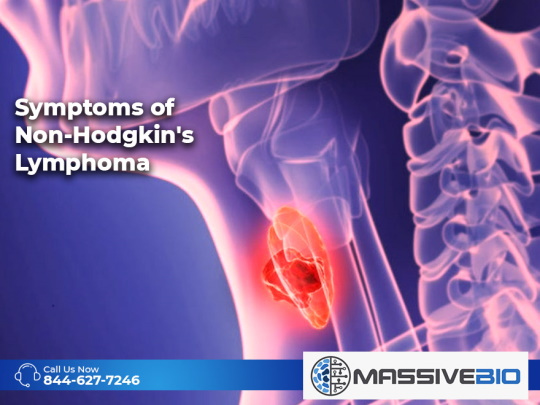Lymphoma is a type of cancer formed by lymphocytes. It is a general name given to a malignant tumor in the lymph tissue. Symptoms of non-Hodgkin’s lymphoma often occur when a painless swelling is noticed in the neck.
The lymphatic system is part of the immune system. The immune system fights infections and other diseases. Symptoms of non-Hodgkin’s lymphoma can also be noticed in the form of enlarged lymph nodes in the chest or abdominal cavity.
What are the Symptoms of Non-Hodgkin Lymphoma?
Non-Hodgkin lymphoma (NHL) is the general name for a group of different blood cancers that share a single characteristic. NHL is divided into 2 groups as B cell lymphomas, arising from abnormal B lymphocytes, and T cell lymphomas, arising from abnormal T lymphocytes.
B cell lymphomas occur more frequently. It can be found in the lymph nodes and lymphoid tissues such as spleen. It can also be caused by lymph tissue in organs such as the stomach and intestines. Malignant lymphoid cells can spread to other parts of the body through the blood and lymph circulation.
Frequently encountered symptoms:
- Swollen, painless lymph nodes in the neck, armpit or groin
- Chest or abdominal pain, swelling or bloating
- Unexplained weight loss
- Extreme weakness and fatigue
- Fever of unknown cause
- Night sweats
- Cough, trouble breathing, or chest pain
- Pain in the bones
- Skin rash and itching
What is Non-Hodgkin Lymphoma Prognosis?
The prognosis is the chance of recovery from a disease and a prediction of how it will progress. For NHL, there are a number of factors that determine the prognosis, such as:
- Non-Hodgkin Lymphoma subtype
- Stage of the disease
- The age and general condition of the patient
- Whether newly diagnosed or has recurrence
- Blood LDH (Lactate Dehydrogenase Enzyme) level
Some types of NHL progress faster than others, and if left untreated, the patient’s overall health can rapidly deteriorate. These are referred to as aggressive non-Hodgkin lymphomas. Some HDLs are slow-progressing (painless) lymphomas and can be monitored for years without treatment.
Follicular lymphoma clinical trials
What are the Types of Non-Hodgkin Lymphoma?
Lymphomas can be grouped according to how quickly their possible growth occur:
1-Indolent lymphomas: Grow slowly and tend to causefewer symptoms.
- Follicular lymphoma
- Cutaneous T-cell lymphoma (mycosis fungoides and Sezary syndrome)
- Lymphoplasmacytic lymphoma and Waldenström’s macroglobulinemia
- Marginal zone lymphoma
- Small cell lymphocytic lymphoma (SLL) and chronic lymphocytic leukemia (CLL)
2-Aggressive lymphomas: Grow and spread faster. They tend to cause severe symptoms. Over time, many indolent lymphomas become aggressive lymphomas.
- Diffuse large B-cell lymphoma (DLBCL)
- Anaplastic large cell lymphoma
- Mostly peripheral T-cell lymphoma subtypes
- Transformed follicular lymphoma
- Transformed MALT lymphoma
- Burkitt lymphoma
- Central nervous system (CNS) lymphoma
- Mantle cell lymphoma
- AIDS-related lymphoma
Non-Hodgkin’s Lymphoma Clinical Trials
Massive Bio can match your unique characteristics and cancer with thousands of active clinical trials near you, thanks to its first-class Artificial Intelligence-based search engine. Our clinical trial screening process takes into account all aspects of your individual cancer case and ensures that the matches we provide are the best for you and your cancer diagnosis.





1 Comment
very well explaned